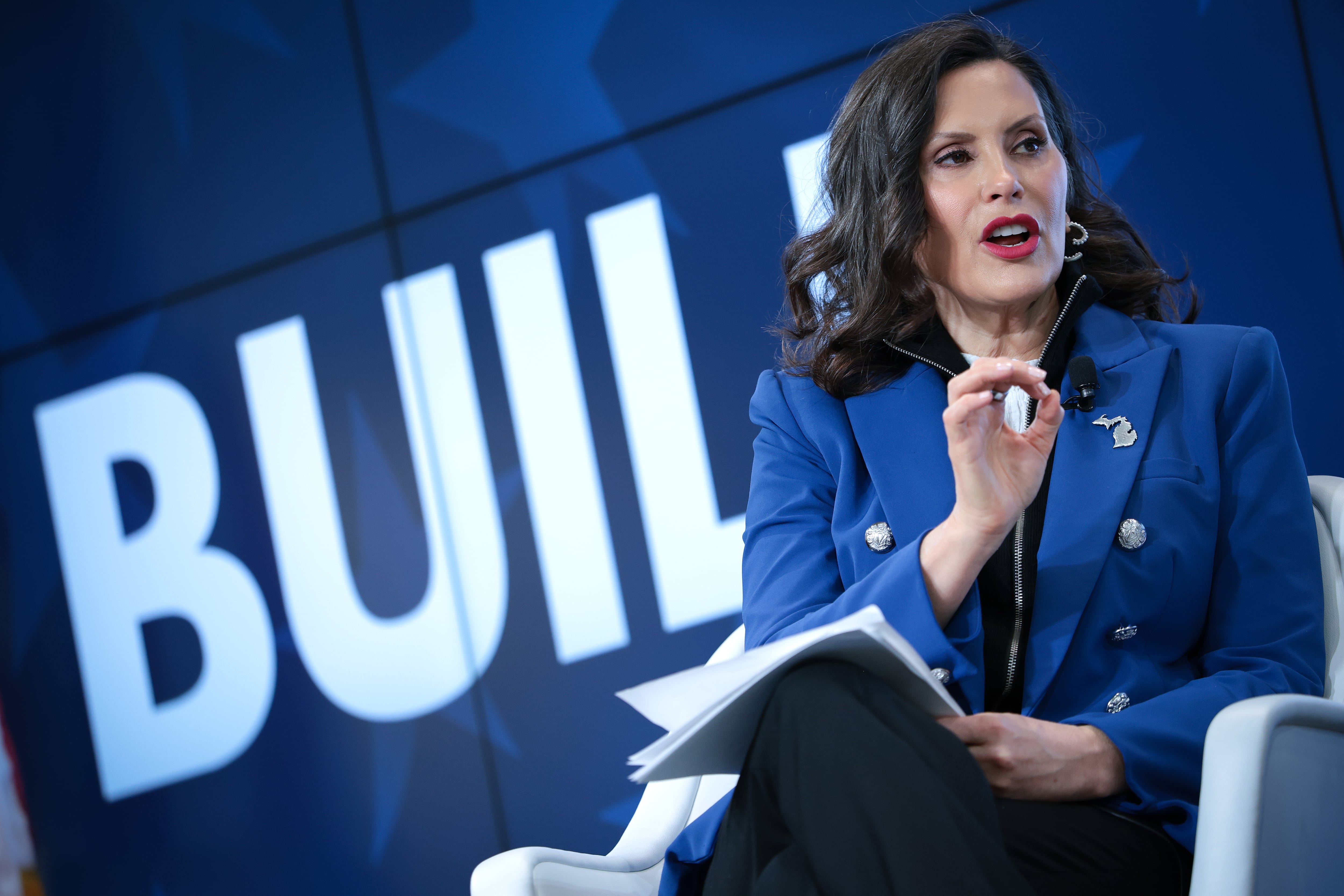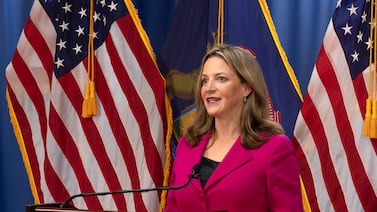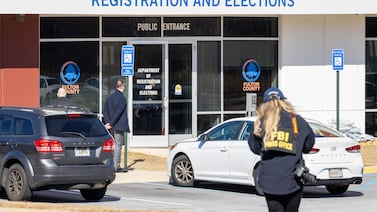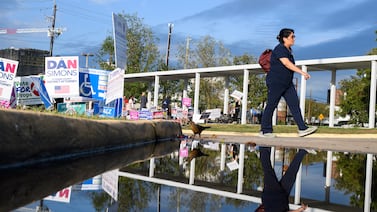LANSING — It’s been more than 200 days since residents of Michigan’s 35th District have had a state Senator, prompting growing and bipartisan complaints over Gov. Gretchen Whitmer’s refusal to call a special election to fill a vacant seat.
“We’re being taxed, but we have no representative in the state Senate. I think that’s egregious,” Saginaw County Democratic Party Chair Brandell Adams said this week.
Brandell is among three candidates who have so far filed to run for the seat in a district that includes parts of Bay, Midland and Saginaw counties. It’s been vacant since Jan. 3, when Democrat Kristen McDonald Rivet began her new job in Congress, leaving about 270,000 residents without a state senator.
Under Michigan law, only the governor has the power to call a special election to fill the seat for the remainder of the term, which runs through next year. Whitmer has not said when she’ll do so — or why it’s taken so long.
“We expect an announcement will be made in the near future,” Whitmer spokesperson Stacey LaRouche said Wednesday in a text message. “We will keep you posted.”
The governor’s office has offered variations on that statement for months but missed opportunities to utilize existing election dates to fill the seat, including Tuesday’s municipal primary.
In the meantime, the absence of a state Senator “has real consequences” for people in the district, said state Rep. Bill G. Schuette, a Midland Republican who is considering a run should Whitmer call a special election.
“We’re debating serious issues in the state Legislature, whether it’s our state’s budget, how we finally work to fix our roads … ,” he said. “People in the Great Lakes Bay region only have half of their voice.”
Schuette and other Republicans have continued to question the delay, accusing Whitmer of petty politics driven by a fear that the district will flip to Republicans.
Should it, Democrats and Republicans would each hold 19 seats in the state Senate.
Democratic Lt. Gov. Garlin Gilchrist would have the power to break a tie, but Republicans could effectively block bills by asking a lawmaker to miss session. In the event of a 19-18 vote, a bill would fail, with no opportunity for Gilchrist to provide the 20th vote necessary for passage.
“It seems like Gov. Whitmer is very intent on doing the most political thing, because it seems like they’re afraid they’re going to lose the seat to Republicans,” said Senate Minority Leader Aric Nesbitt, R-Porter Township. “It’s blatantly political, partisan politics that they’re playing.”
People in the district ‘deprived of representation’
It’s not uncommon for a lawmaker to leave office before their term concludes. But Michigan’s solution — giving the governor almost absolute control to call an election with little restriction on timing — is a poor solution, experts say.
“This is an endemic problem,” said Quinn Yeargain, a professor of law at Michigan State University. “Any time there’s a vacancy and you have to have a special election, there’s going to be a period of time in which nobody is in the seat and the people are functionally deprived of representation.”
Half of U.S. states instead use some version of an appointment system — typically, where the party that previously held the seat gives names to the governor for a replacement candidate — to expedite the process.
Political appointments can appear undemocratic, Yeargain said, but they help ensure voters do not lack representation for prolonged periods.
Michigan lawmakers in recent years have tried but failed to force a timeline for filing vacant seats in the state Legislature.
Former state Rep. Andrea Schroeder introduced a bill in June 2021 that would require a governor to announce within 30 days of a vacancy whether there will be a special election to finish the term.
The bill was personal for Schroeder, a Republican from Independence Township: She had been diagnosed with stomach cancer, and she died in October of that year.
Lawmakers in the House and Senate approved the legislation, but Whitmer vetoed it, saying she would “not tie the hands of future Michigan governors.”
Schuette, the Midland Republican, introduced a similar bill this year that would require a special election within 180 days of a legislative vacancy.
The proposal was co-sponsored by 16 Republican colleagues and referred to the House Election Integrity Committee in June. The GOP-led House has yet to hold a hearing on the bill, however.
State Board of Education Chair Pamela Pugh, a Saginaw Democrat who has already filed to run for the vacant seat, said Whitmer may have a good reason for not yet calling a special election, including ongoing negotiations over the state budget and road funding talks in Lansing.
But it’s getting to the point where she needs “to bump us up on that priority list,” Pugh said, adding later: “We are asking her to prioritize us. This district. A district that has great needs.”
The cost of a special election
A lack of clarity around when — or even if — Whitmer will call a special election also leaves local election officials in a lurch.
Whitmer could call a special election to be run outside of the standard schedule, which can prove expensive and labor-intensive for clerks who will only have a single question on the ballot.
It’s not uncommon, as both May and August local elections frequently have little on the ballot. But any election requires a lot of clerks, from the ballot design to machine testing to counting ballots, and balancing that with the many other tasks they manage can be tricky.
The governor could also call a special election to coincide with other upcoming election dates. That might be easier on clerks, but it would likely also mean the state Senate seat stays vacant into next year.
State law requires that there is first a primary, Department of State spokesperson Cheri Hardmon confirmed. It’s far too late to get the race on next week’s ballot, and the language for much of the November ballot is finalized by the middle of the month to meet state and federal requirements.
Officials in the affected counties said they haven’t heard anything about possible special election dates from the Whitmer administration or the Michigan Bureau of Elections.
It’s been “radio silence,” said Bay County Clerk Katie Zanotti, who is concerned about the potential timing.
If the election is scheduled for later this year, officials could be looking at canvassing during the holidays. If it waits until 2026, Zanotti and other local clerks could have to run four elections next year, including major statewide primary and general elections for governor, U.S. Senate, the Legislature and more.
That was “really challenging” for fellow clerks when it happened last year in Metro Detroit, said Zanotti, a Democrat.
“I wish it would have been called much, much sooner,” she said. “Otherwise, it’s going to be a mad dash if it gets called at all, and I don’t know if it’s going to be.”
Jordyn Hermani covers state policy and politics for Bridge Michigan. She can be reached at jhermani@bridgemi.com. Hayley Harding is a reporter for Votebeat based in Michigan. Contact Hayley at hharding@votebeat.org.





